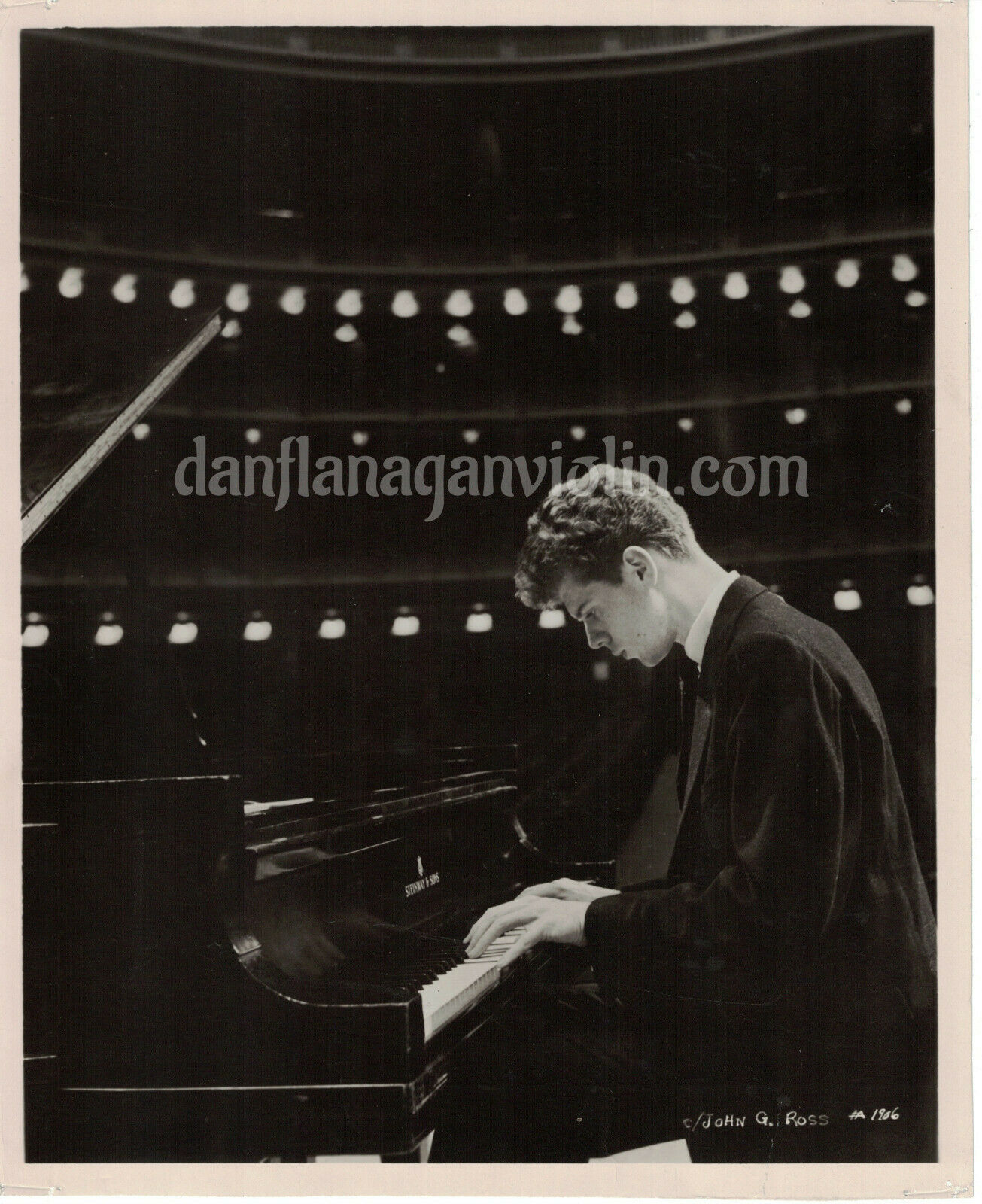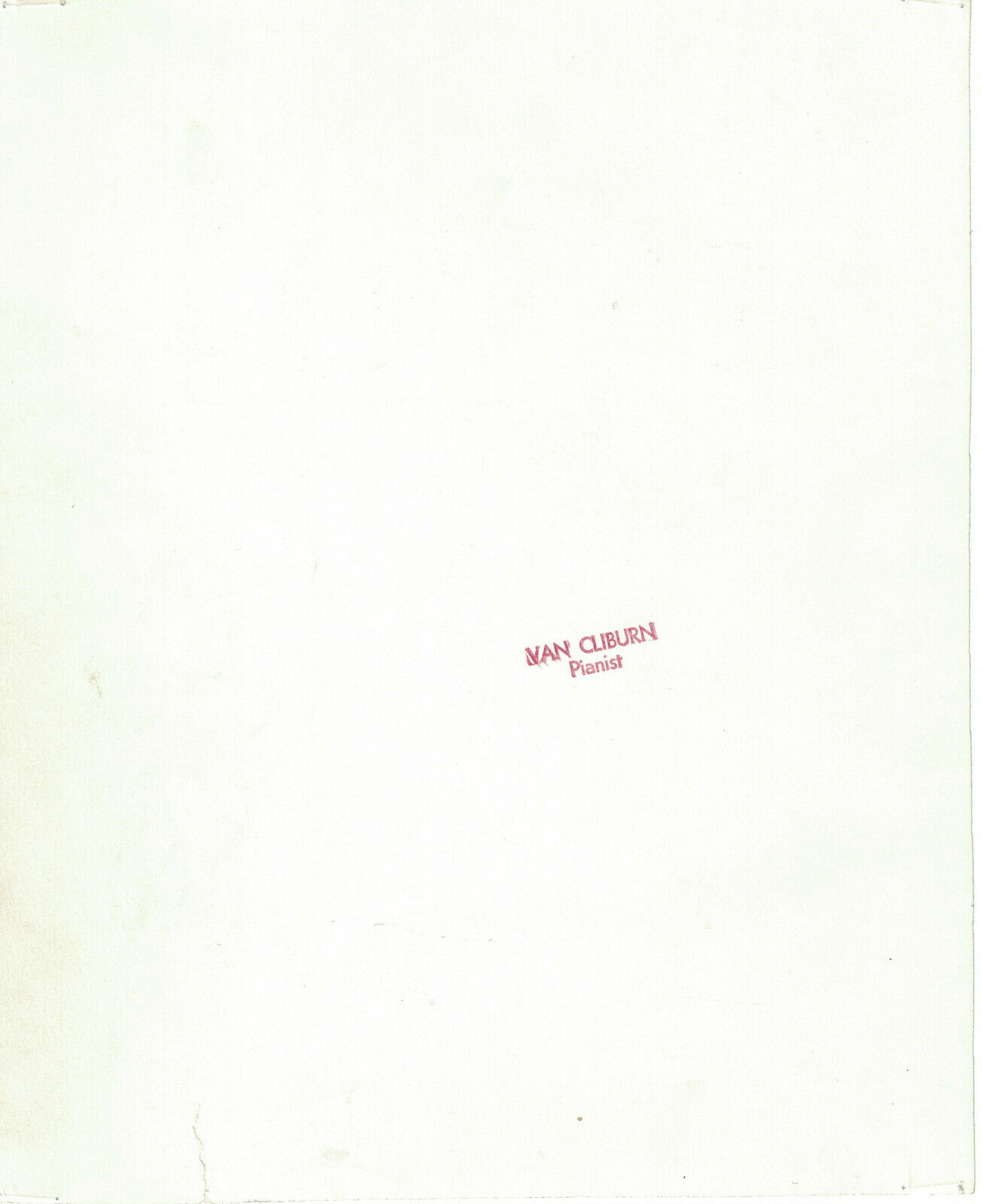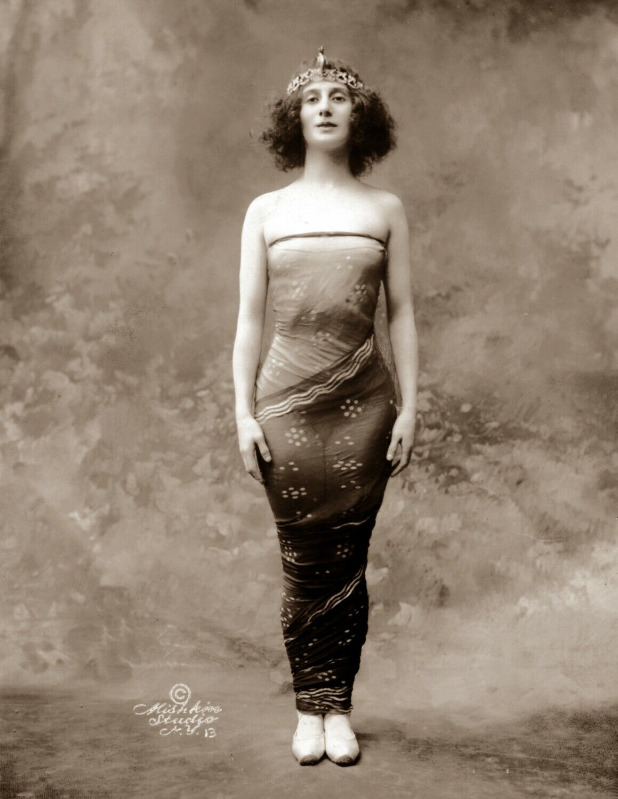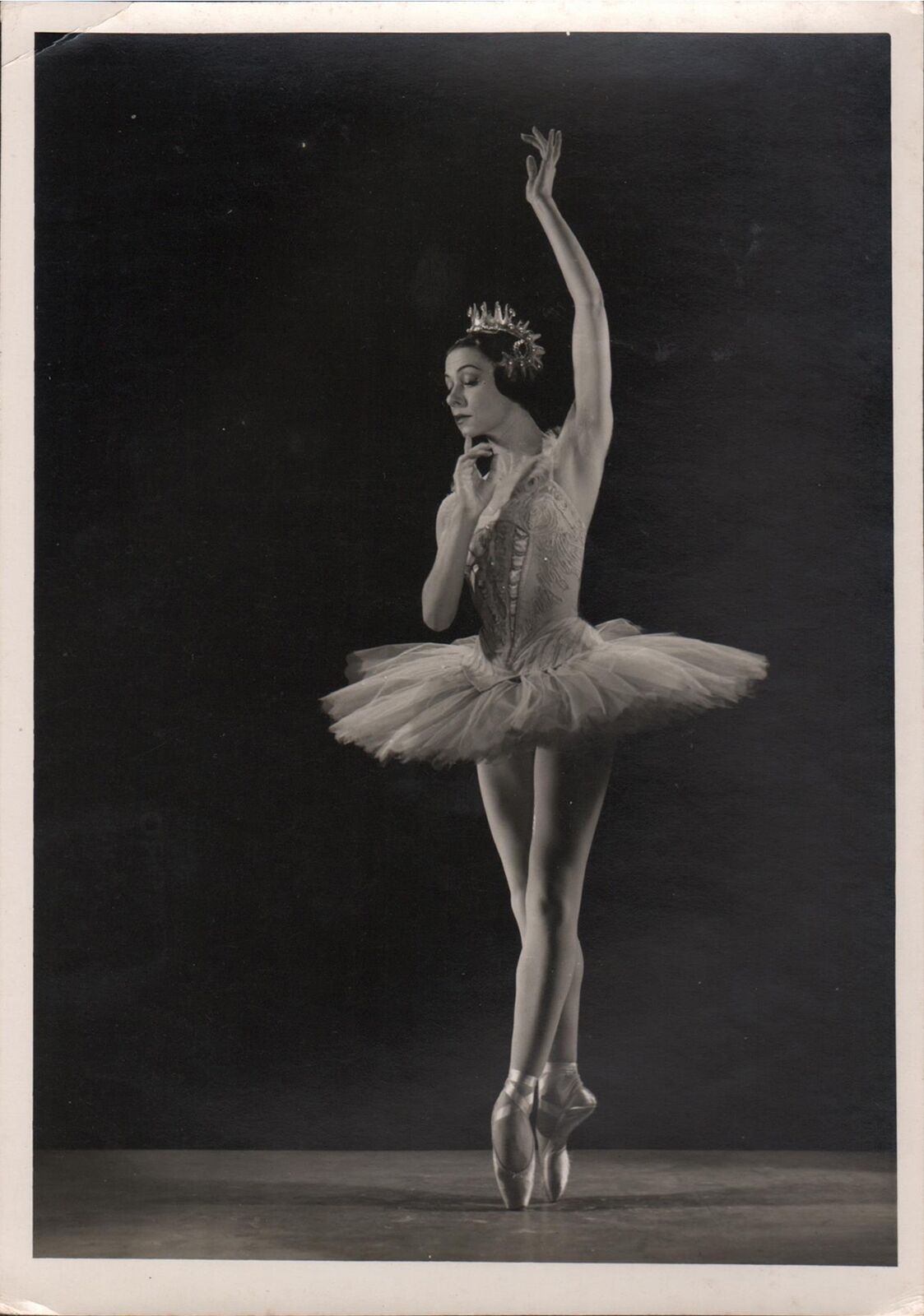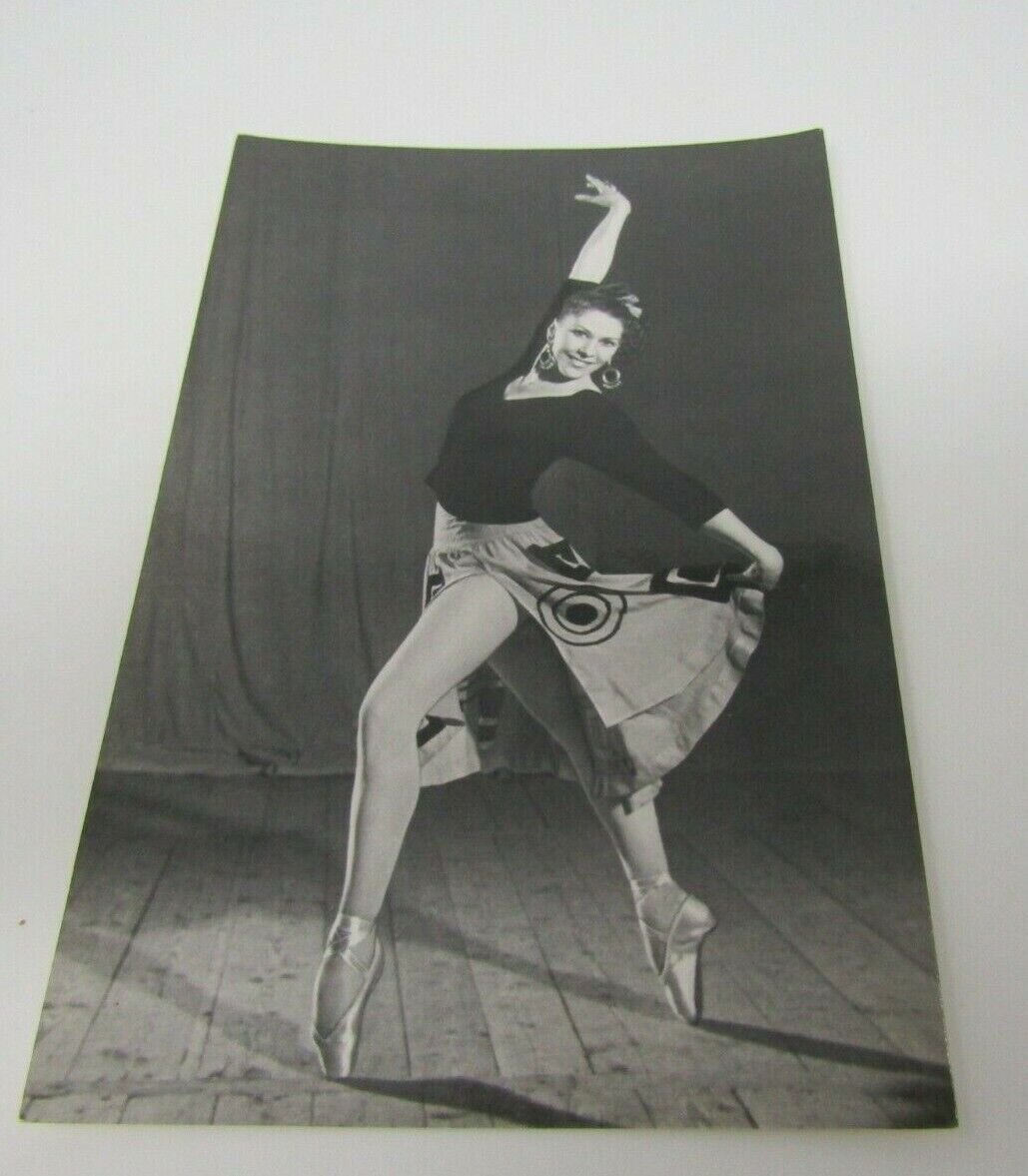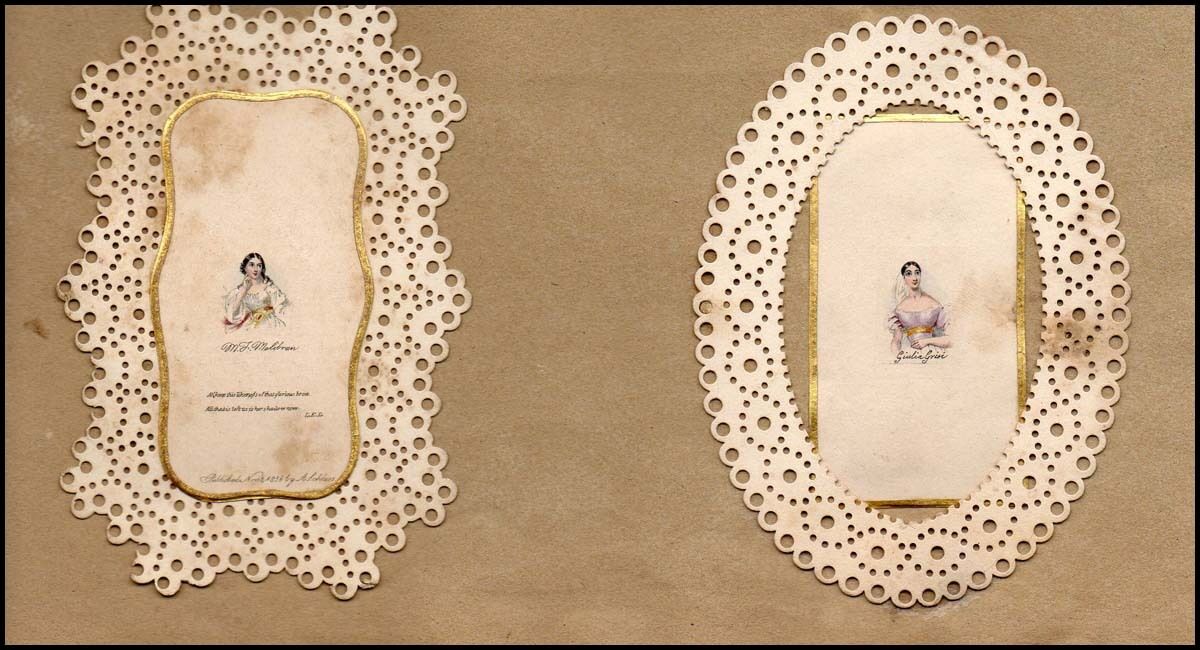-40%
Van Cliburn publicity photo 8x10 piano pianist
$ 23.75
- Description
- Size Guide
Description
Hello!For sale I have an original 8x10 publicity photo for the pianist Van Cliburn. Signed in the photo "John G. Ross." It looks like it might be in Carnegie Hall. The back is stamped. Excellent condition. There are staple holes in the frame that don't impact the image. USPS Priority Mail.
I have been a professional violinist for 20 years. I currently teach violin at University of California, Berkeley, and play Concertmaster for the Sacramento Philharmonic and Opera. I've been buying and selling music memorabilia on eBay since it was invented and I've been buying antique art from European and American auction houses for a decade. All pieces for sale are guaranteed authentic and come from my personal collection, which numbers in the thousands.
To learn more about me before buying, visit danflanaganviolin dot com.
Harvey Lavan
"
Van
"
Cliburn Jr.
(July 12, 1934 – February 27, 2013)
[1]
was an American
pianist
who, at the age of 23, achieved worldwide recognition when he won the inaugural
International Tchaikovsky Competition
in
Moscow
in 1958 (during the
Cold War
).
[2]
Cliburn's mother, a piano teacher and an accomplished pianist in her own right, discovered him playing at age three, mimicking one of her students and arranged for him to start taking lessons.
[2]
Cliburn developed a rich, round tone and a singing-voice-like phrasing, having been taught from the start to sing each piece.
[2]
Cliburn toured domestically and overseas. He played for royalty, heads of state, and every
US president
from
Harry S. Truman
to
Barack Obama
.
Cliburn was born in
Shreveport
,
Louisiana
, the son of Rildia Bee (
née
O'Bryan) and Harvey Lavan Cliburn Sr.
[4]
When he was three, he began taking piano lessons from his mother, who had studied under
Arthur Friedheim
,
[5]
a pupil of
Franz Liszt
.
[2]
When Cliburn was six, his father, who worked in the oil industry,
[6]
moved the family to
Kilgore, Texas
.
At 12, Cliburn won a statewide piano competition, which led to his debut with the
Houston Symphony Orchestra
.
[7]
He entered the
Juilliard School
in
New York City
at 17
[7]
and studied under
Rosina Lhévinne
,
[7]
who trained him in the tradition of the great Russian
romantics
. At 20, Cliburn won the
Leventritt Award
[7]
and made his debut at
Carnegie Hall
.
The first
International Tchaikovsky Competition
in 1958 was an event designed to demonstrate Soviet cultural superiority during the
Cold War
, after the
USSR
's technological victory with the
Sputnik
launch in October 1957. Cliburn's performance at the competition finale of
Tchaikovsky
's
Piano Concerto No. 1
and
Rachmaninoff
's
Piano Concerto No. 3
on April 13 earned him a standing ovation lasting eight minutes.
[9]
[10]
After the ovation, Van Cliburn made a brief speech in Russian and then resumed his seat at the piano and
began to play
—to the surprise and delight of the Russian musicians visible behind him
in the film made of his part in the competition
—his own piano arrangement of the much-beloved song "
Moscow Nights
," which, as the response shows, further endeared him to the Russians. When it was time to announce the winner, the judges felt obliged to ask permission of the Soviet leader
Nikita Khrushchev
to give the first prize to an American. "Is he the best?" Khrushchev asked. "Yes." "Then give him the prize!"
[9]
[11]
Cliburn returned home to a
ticker-tape parade
in New York City, the only time the honor has been accorded a classical musician. Arriving at
City Hall
after the parade, Cliburn told the audience:
I appreciate more than you will ever know that you are honoring me, but the thing that thrills me the most is that you are honoring classical music. Because I'm only one of many. I'm only a witness and a messenger. Because I believe so much in the beauty, the construction, the architecture invisible, the importance for all generations, for young people to come that it will help their minds, develop their attitudes, and give them values. That is why I'm so grateful that you have honored me in that spirit.
[12]
A cover story in
Time
magazine proclaimed him "The Texan Who Conquered Russia".
[13]
His triumph in Moscow propelled Cliburn to international prominence.
[14]
Cultural diplomat
New York Times
writer Bernard Holland shared some beautiful words from Cliburn in a 1989 article.
My relationship with the Russians was personal, not political,
Mr. Cliburn said in a recent interview.
I had looked at pictures of Moscow when I was 5 years old, and I had always wanted to go there. My first night there I got permission to go down and see Red Square and the Kremlin. I felt so at home with these people, and I felt it immediately.
In this article, Bernard Holland writes about Cliburn's heart that stayed consistent through his career as an artist and as a diplomat. Holland also tells of Cliburn's lasting relationship with
Nikita Khrushchev
, the Soviet leader who was a huge fan of Cliburn and actually the one who is pictured at the Tchaikovsky competition pinning an award on Cliburn. Cliburn's lasting love and care for the Russians was evident over the years in his music and his life.
[15]
Success
Upon returning to the United States, Cliburn appeared in a Carnegie Hall concert with the
Symphony of the Air
, conducted by
Kirill Kondrashin
, who had led the
Moscow Philharmonic
in the prize-winning performances in Moscow.
[7]
The performance of the Rachmaninoff 3rd Piano Concerto at this concert was subsequently released by
RCA Victor
on LP. Cliburn was also invited by
Steve Allen
to play a solo during Allen's prime time
NBC
television series
on May 25, 1958.
[16]
He later went to the
White House
to meet with
President Eisenhower
to discuss relations with the
USSR
.
RCA Victor
signed him to an exclusive contract, and his subsequent recording of the Tchaikovsky Piano Concerto No. 1 won the 1958
Grammy Award for Best Classical Performance
. It was certified a
gold record
in 1961, and it became the first classical album to go
platinum
, achieving that certification in 1989.
[17]
[18]
It was the best-selling classical album in the world for more than a decade.
[
citation needed
]
It eventually went triple-platinum.
[19]
In 2004, this recording was re-mastered from the original studio analogue tapes, and released on a
Super Audio CD
.
Other standard repertoire Cliburn recorded include the
Schumann
Piano Concerto in A minor
,
Grieg
Piano Concerto in A minor
,
Rachmaninoff
Piano Concerto No. 2
,
Beethoven
Piano Concerto No. 4
and
No. 5 "Emperor"
, and the
Prokofiev
Piano Concerto No. 3
.
In 1958, during a dinner hosted by the National Guild of Piano Teachers,
[20]
President and Founder Dr. Irl Allison announced a cash prize of ,000 to be used for a piano competition named in Cliburn's honor. Under the leadership of Grace Ward Lankford and with the dedicated efforts of local music teachers and volunteers, the First
Van Cliburn International Piano Competition
was held from September 24 to October 7, 1962, at
Texas Christian University
in
Fort Worth
.
[7]
Until his death, Cliburn continued to serve as Director Emeritus for the
Van Cliburn Foundation
, as host of the quadrennial competition and host of other programs honoring his legacy.
In 1961, he first performed at the
Interlochen Center for the Arts
during its summer camp. He went on to do so for eighteen more years, his last visit to the school being in 2006.
Cliburn returned to the Soviet Union on several occasions.
[7]
His performances there were usually recorded and even televised. In a 1962 Moscow appearance, Nikita Khrushchev, who met Cliburn again on this visit,
[11]
and
Andrei Gromyko
, the Soviet Foreign Minister, were "spotted in the audience applauding enthusiastically".
[21]
According to
The Wall Street Journal
, "Mr. Cliburn's affection for the Soviet people—and theirs for him—was notable in its warmth during a prolonged period of superpower strain."
[2]
A 1972 concert performance of the
Brahms
Piano Concerto No. 2
with Kondrashin and the Moscow orchestra, as well as a studio recording of Rachmaninoff's
Rhapsody on a Theme of Paganini
, were later issued on CD by RCA Victor.
[22]
On May 26, 1972, Cliburn gave a concert at
Spaso House
, the residence of the
United States Ambassador to Russia
, for an audience that included President
Richard Nixon
, Secretary of State
William P. Rogers
, and Soviet government officials.
Comeback
Cliburn performed and recorded through the 1970s, but in 1978, after the deaths of his father and of his manager,
Sol Hurok
, he began a hiatus from public life. In 1987, he was invited to perform at the
White House
for President
Ronald Reagan
and Soviet president
Mikhail Gorbachev
[2]
and afterward was invited to open the 100th anniversary season of
Carnegie Hall
. He embarked on a 16-city tour in 1994, commencing with a performance of the Tchaikovsky concerto at the
Hollywood Bowl
. Also in 1994, Cliburn made a guest appearance in the cartoon
Iron Man
, playing himself in the episode "Silence My Companion, Death My Destination". In his late seventies, he gave a limited number of performances to critical and popular acclaim.
[
citation needed
]
Cliburn appeared as a
Pennington Great Performers
series artist with the
Baton Rouge Symphony Orchestra
in 2006. In 2006 he performed at
Interlochen Center for the Arts
, spending two hours talking to the students afterwards and signing their programs while many waited at a reception at the school's president's house.
He played for royalty and heads of state from dozens of countries and for every U.S. president from 1958 until his death.
Cliburn received the
Kennedy Center Honors
on December 2, 2001. He was awarded the
Presidential Medal of Freedom
on July 23, 2003
[24]
by President
George W. Bush
, and, on September 20, 2004, the Russian
Order of Friendship
, the highest civilian awards of the two countries. He was also awarded the
Grammy Lifetime Achievement Award
the same year and played at a surprise 50th birthday party for
United States Secretary of State
Condoleezza Rice
. He was a member of the Alpha Chi chapter of
Phi Mu Alpha Sinfonia
, and was awarded the fraternity's
Charles E. Lutton Man of Music Award
in 1962. He was presented a 2010
National Medal of Arts
by President Barack Obama on March 2, 2011.
[23]
[25]
Cliburn's 1958 piano performance in
Moscow
, when he won the prestigious
Tchaikovsky International Piano Competition
, has been added to the
National Recording Registry
in the
Library of Congress
for long-term preservation.
The Wall Street Journal
said on his death that Cliburn was a "cultural hero" who "rocketed to unheard-of stardom for a classical musician in the U.S."
[2]
Calling him "the rare classical musician to enjoy rock star status", the
Associated Press
on his death noted the 1958
Time
magazine cover story that likened him to "
Horowitz
,
Liberace
, and
Presley
all rolled into one".
[14]
A year after Cliburn's death, a free anniversary concert was held on February 27, 2014, in his honor in downtown Fort Worth. "It's part of the Cliburn ideology of sharing the music with the larger audience," said Jacques Marquis, the Cliburn Foundation president. Cliburn lent his name to the International Piano Competition, which he viewed as a gathering of classical masterpieces played by young gifted artists.
[35]
A highlight of Cliburn's legacy was the profoundly positive reception of his person and performances in the Soviet Union during and after the Tchaikovsky competition. The same is true of his reception during and after the Cold War in the Soviet Union. According to
Life
(1958), the excitement and hype surrounding the news of Cliburn's debut in Moscow was almost too much to bear for some. They became infatuated with him and made no attempt to conceal it. “In the preliminaries, which had enlisted 50 young pianists from 19 different countries, Van was the big crowd-pleaser. Fans called him Vanyusha. Girls trailed him to the hotel. Soviet record companies pleaded with him to wax anything. In the finals, when he crashed out the last chords of the Rachmaninoff Third Concerto, the ecstatic audience in Moscow chanted “first prize-first prize.”
[36]
Mark MacNamara of the
San Francisco Classical Voice
wrote: "The 6-foot 4-inch aw-shucks kid from Shreveport was 23, the son of an oil executive and a Juilliard graduate, and by all accounts didn't have a mean bone in his body. Indeed, much of his charm, then and throughout his life, was that he seemed so genuinely unaware of intrigue and enmity. Cliburn's talents were astounding, and he had a heart that loved people and music. This is a legacy that lasts."
[37]
As of the last
International Tchaikovsky Competition
(2019), Van Cliburn is still the only American to win the competition in piano. Interestingly, only two native-born Americans have won the
Van Cliburn International Piano Competition
in its 58 year history.
Cliburn's contributions to society were many and one of his greatest contributions was the Van Cliburn International Piano Competition.
Lisa McCormick, writing in Sage Journals (2009), explains the competition this way:
Founded in 1958, the Cliburn is held every four years and is open to pianists between the ages of 18 and 30. Through screening auditions held in five cities around the world, 35 pianists are chosen to participate in the competition in Fort Worth, Texas, where their performances are open to the public and judged by a distinguished international jury. Since its third cycle, the Cliburn has qualified to be a member of the
World Federation of International Music Competitions
. (Sage Journals 2009)
For many young pianists, Cliburn is not only a symbol of talent and inspiration, but a friend to the arts that shows how appreciation for music is powerful, and his impact on the tensions of the Cold War was certainly one of distinct and unique merit.
